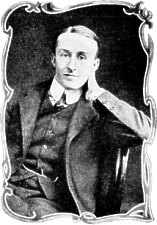
[From 1912 Examiner Annual]

Mr. Bertram Edward Sargeaunt, Government Secretary and Treasurer of the Isle of Man, succeeded the late Mr. A. B. H. Story in these offices, his appointment being announced on June 10th, 1910. In addition to the Government Secretaryship and Treasurership, Mr. Sargeaunt holds the positions of Clerk to the Council and Registrar-General for the Isle of Man. From 1898 to 1910 Mr. Sargeaunt was Assistant-Secretary and curator of the Royal United Service Institution. He also held a commission as Captain in the 12th (County of London) Battalion, the London Regiment. He is the author of several works, including a history of weapons of war, and the history of the Royal Monmouthshire RE. Militia. For some time he was assistant Editor of the "Cavalry Journal." Mr. Sargeaunt has amply justified his appointment by his business methods and energy and fine powers of organisation in connection with the public service of the Isle of Man.
[also wrote IoM & the Great War]
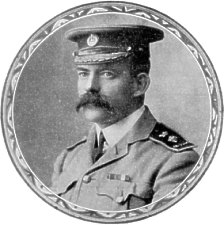
Lieutenant-Colonel H. W. Madoc, Chief Constable of the Isle of Man, succeeded Colonel Freeth, M.V.O. in the office, his appointment by the Lieut.-Governor (Lord Raglan), being announced early in July, 1911. Previous to nomination to the control of the Isle of Man Constabulary, Col. Madoc was Acting-Commissioner of the Transvaal Police. He was appointed Major in the South African Constabulary in 1900, and subsequently became Lieutenant-Colonel commanding in the Western Transvaal District. He was promoted Assistant Inspector-General in 1906, and later became Acting Inspector General. On the amalgamation of the South African Constabulary and the Johannesburg Police, Colonel Madoc was appointed Deputy-Commissioner and second in command of the Transvaal Police. During the last Boer war, he saw considerable service and gained high distinction in connection with the defence of Kimberley and the relief of Mafeking.
[Henry William Madoc was a keen ornithologist and wrote a book on Birds on Isle of Man, died 7th January, 1937, shortly after retirement in 1936. Probably the main person responsible for the excellent design of the Knockaloe WWI Internment camps as he had seen the great loss of life caused by inadequate design of the British civilian concentration camps in the Boer War. Appointed commandant of the Douglas Internment camp from its opening until he re-assumed his position as Chief Constable in early 1919]
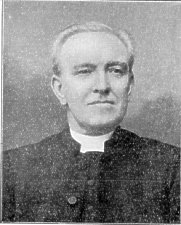
Mr. Ellis is a native of Holywell, North Wales. After three years’ preparation at the Wesleyan College, Richmond, he was appointed to missionary work in India, remaining there for ten years—twelve months in Bengal, and nine years among the Tamil people of Madras. Since returning to the home country, Mr. Ellis has been stationed in several circuits in Wales, where he was also General Secretary for Foreign Missions by appointment of the Welsh Methodist Assembly. After being Superintendent of the Ramsey Circuit for three years past, he accepted the invitation of Douglas to succeed the Rev. W. H. Moseley in the superintendency of the circuit, and the Conference (1911) appointed him Chairman of the Isle of Man District.
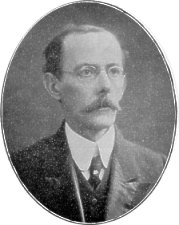
Mr. John Kay, B.A. (Lond.), Head Master of the " Major Lester" Memorial Council School, is the President of the Liverpool Manx Society. Mr. Kay is one of the best known of English teachers, and in 1912 enters on the Presidency of the National Association of Head Teachers. He is a well-known and popular contributor to various literary and educational journals. Mr. Kay is the son of the late Mr. Henry Kay, of Castletown and Edge Hill, and grandson of Mr. Thomas Kay, once Master of Castletown National Schools.
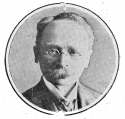
Charles Roeder, whose death took place (1911) in Manchester, at the age of 63, was a recognised authority on the archaeology, philology, literature, and folklore of the Isle of Man, and was a frequent and valued contributor to the 'Isle of Man Examiner' on these subjects. He was a native of Thuringia, and came to Manchester when twenty-one years old, where he engaged in commerce, but devoted his spare time to research in languages, geology, botany, history, and antiquities. His 'Manx Notes and Queries' are of great value to students, while equally interesting are his other works concerning this Island. He edited the translation into Manx by the late Mr. Edward Faragher (Cregneish), of Aesop's Fables, and wrote an introduction, partly biographical of character, to Mr. Faragher's poems and folk-stories.
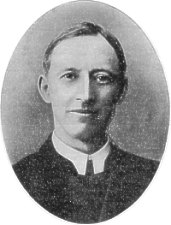
Mr. Oakley became a minister in the Primitive Methodist Connexion at an early age, going into circuit work before he was 20 years old. Redditch, in Worcestershire, was his first station; followed by five years at Leominster, eight years at Kiiderminster, and four years at Oswestry, He came to Douglas in July 1910 taking up the circuit superintendency. Mr Oakley has been associated with the building of four new churches and one Sunday-school, and he has been for two years one of the con-nexional examiners of candidates for the ministry. He has just been elected President of the Manx Free Church Council, for the year 1911-12,
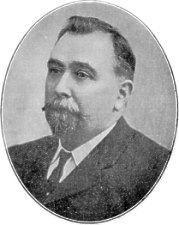
The Manchester Manx Society made a very proper selection when they chose their president for the session 1911-12—viz., Mr. William Kelly, who hails from Kirk German, the heart of Manxland, the parish wherein the renowned Tynwald Hill is situate. Mr. Kelly occupies a good position in the world-famed manufacturing city as chief-engineer, and has been in his present situation for some twenty-eight years.
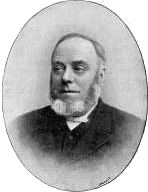
Born in Rochdale in 1833, of Primitive Methodist parentage, Mr. Harris entered the ministry in 1856, and has travelled in the following circuits, viz., Bury, Northwich (twice), Bradwell, Douglas (twice, 1859—70), Peel (thrice, 1861—89—1901), Stockport 1st. (thrice), Castletown (twice 1865—69), Glossop, Wigan, Middleton, Bolton 1st., and Bacup. No other minister has spent so much of his active ministry in Manxland. In regard to Insular church buildings, he has been connected with the erection or enlarging of several, including Port St. Mary (old and new), Colby, Ballasalla, Onchan, Baldhoon, Laxey, and Drumgold-street School, Douglas. He has been eminently successful in enlisting new converts, and in inducing young men to become ministers or local preachers. Superannuated since 1901, Mr. Harris has continued church work with unabated activity at Port St. Mary, where he resides.
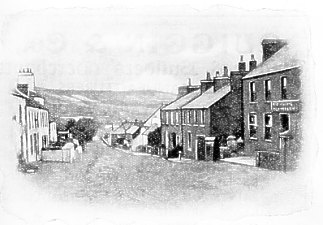
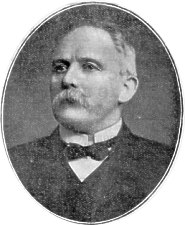
Mr Thomas Faragher, now of Manchester, hails from Foxdale. Some twenty-eight years ago—being then of the age of about twenty-seven-he removed to the great cotton centre, taking a situation with the Manchester Navigation and Ship Canal Co., in whose service he still continues. He is an enthusiastic member of the Manx Society in his adopted city.
The need of more berthing accommodation for steamers at Douglas has long been felt, and as an instalment in this direction the Harbour Commissioners have now in hand the work of widening the Victoria Pier at its base, on the south side, by an additional 17ft. 6in., extending in length from the Packet Coy’s luggage offices to the Steam Ferry steps. The work is to have a pile foundation, and will be constructed of reinforced concrete, Improved shelters for the pier officials are being erected at the pier head.
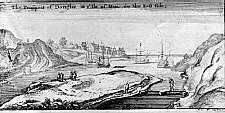
Douglas Harbour as in the year 1656 [see
King's
Views]
Much larger works are in contemplation, of which the feature is the lengthening of the old Red Pier. The scheme, however, is involved with proposals for an improved roadway along the site occupied by the Steam Packet Company’s offices and the Royal Hotel, and for better facilities for reaching the Railway Station ; and negotiations having these improvements in view proceed very slowly.
The Harbour Commissioners’ income at Douglas includes the following amounts, which will be of general interest :—
Amount of passenger tax to September 30th, 1911 £4,858
One year’s harbour dues 1,270
Rents, Victoria Pier Buildings 1,160
Letting of Ferries (steam and row boats) 332
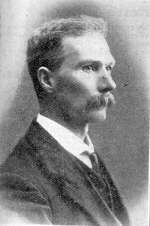
Mr. Craine holds the position of District Chief Ruler in the Rechabite Order. A native of Lonan parish, he has been in business in Laxey for many years. He is an active and reliable worker in every branch of work carried on by the Primitive Methodist Church, with which he has had a life-long association. Also his position in Manx Rechabitism is the reward of merit, a due recognition of faithful service in the local tent, of which he is secretary.
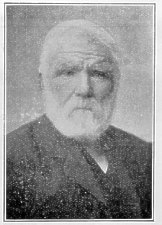
I am native here, and to the manner born." So might Mr. Thomas Lewin, of Baldrine, say. His name commands household veneration in the parish of Lonan, as did that of his revered father before him.
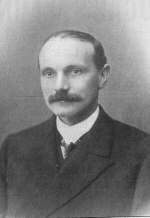
The Rev. Wm. Carr, though a Lancashire man, is thoroughly at home in the Isle of Man he having married a Manx lady. He underwent training at Hartley College, and has been 15 years in the Primitive Methodist ministry. His first term of ministerial service in the Island was in Douglas, while he now superintends the Laxey circuit. In Crewe and in Spen Valley he was prominent in Free Church Council work. In regard to Insular religious enterprise, he assisted in forming the I.o.M. Christian Endeavour Union, of which he is now president. The successful P.S.A. at Laxey (now in its third winter’s work) has had Mr. Carr’s leadership and presidency from the start ; and his penchant in regard to social conditions is shown by his recent appearance in the Douglas courts—first in opposition to the grant of a new liquor licence at Baldrine, and secondly in protesting against compulsory vaccination.
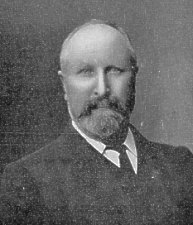
Mr. William Christian, of Kirby, Braddan, was elected as one of the representatives of Middle Sheading in the House of Keys in November, 1910, on a vacancy being caused by the resignation of Mr. G. Fred Clucas A moderate Conservative in politics, Mr. Christian generally takes a broad view of public questions, to the consideration of which he brings a keen business mind to bear. He is one of the most enterprising tenant farmers in the Isle of Man, and has been particularly successful in stock breeding. Upon Manx agricultural questions he is regarded as a foremost authority. Mr. Christian is a churchwarden of Braddan.
|
|
||
|
Any comments, errors or omissions
gratefully received The
Editor |
||